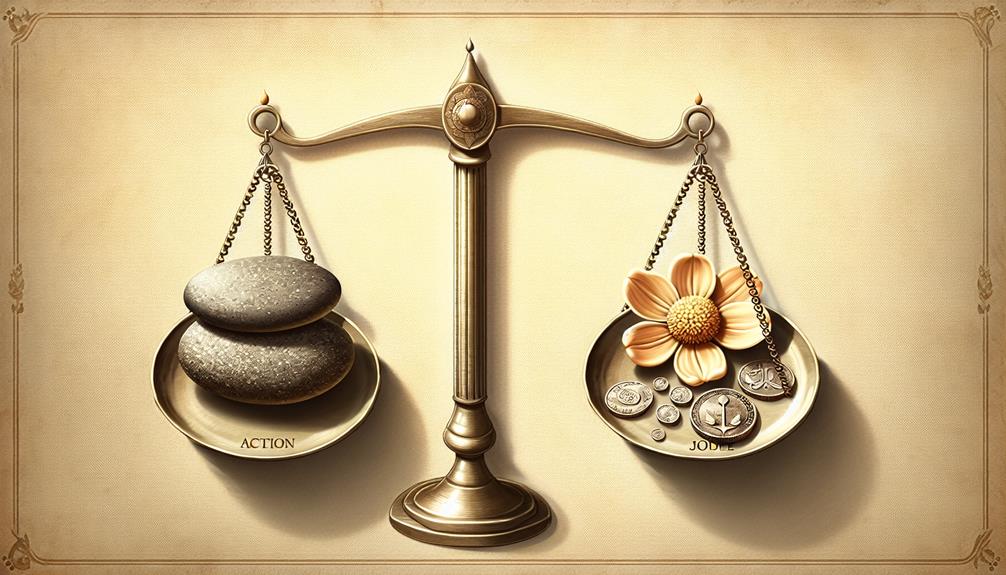What Is The Literal Translation Of Karma
Karma, a concept deeply rooted in Eastern philosophies, holds a significant place in the understanding of cause and effect.
What Is The Literal Translation Of Karma
The literal translation of karma from Sanskrit to English offers a glimpse into the intricate layers of its meaning. Originating from the root 'kri,' which means 'to do' or 'to act,' karma embodies a complexity that goes beyond mere actions.
What Is The Literal Translation Of Karma
Dive into the essence of karma, and you may uncover a profound reflection of the interconnectedness between one's intentions, deeds, and their consequences.
What Is The Literal Translation Of Karma
Key Takeaways
- Karma's literal translation is 'action' or 'deed' from the Sanskrit word 'kri.'
- It signifies the cause and effect relationship of actions in various global cultures.
- Karma emphasizes interconnectedness and ethical behavior based on intentions and outcomes.
- The concept of Karma underscores personal responsibility and the power of individual actions in shaping destiny.
The Sanskrit Origins of Karma
The concept of Karma finds its roots in the ancient Sanskrit language, where it is derived from the word 'kri,' meaning action or deed. In its essence, Karma represents the idea that every action we take has consequences, whether immediate or in the future. This concept of cause and effect is deeply ingrained in various cultures and philosophies worldwide, shaping beliefs and behaviors.
What Is The Literal Translation Of Karma
Understanding Karma involves recognizing the interconnectedness of all actions and their outcomes. It suggests that our intentions and actions create a ripple effect that influences our present and future experiences. By embracing this principle, individuals are encouraged to act thoughtfully and ethically, considering the potential repercussions of their deeds.
What Is The Literal Translation Of Karma
While the notion of Karma may vary in interpretation across different belief systems, the fundamental principle remains consistent – the energy we emit through our actions reverberates back to us. This understanding fosters a sense of responsibility and accountability, guiding individuals towards making choices that align with positive values and intentions.
What Is The Literal Translation Of Karma
Karma in Hindu Philosophy
Rooted deeply in the intricate tapestry of Hindu thought and spirituality, Karma epitomizes the eternal cycle of cause and effect shaping individuals' destinies. In Hindu philosophy, Karma holds profound significance:
What Is The Literal Translation Of Karma
- Law of Moral Causation: Karma in Hinduism is not just about actions and their consequences but also about the moral intent behind those actions. It emphasizes the importance of intentions, thoughts, and attitudes in determining the nature of one's Karma.
- Cycle of Rebirth: Central to Hindu belief is the concept of Samsara, the cycle of birth, death, and rebirth. Karma plays a pivotal role in determining the form and circumstances of an individual's next life based on their actions in previous lives.
- Dharma and Karma: Dharma, the righteous path and moral duty, guides individuals in performing Karma that aligns with universal order and righteousness. The concept of Dharma ensures that one's actions contribute positively to the cosmic balance.
- Escape from Samsara: Through self-realization, righteous living, and the accumulation of good Karma, individuals aim to break free from the cycle of Samsara and attain Moksha, liberation from the cycle of birth and death.
Karma in Buddhism and Jainism
In Buddhist and Jain teachings, Karma holds a central place in shaping individuals' spiritual journey and determining their future existences. Both traditions emphasize the concept of Karma as the law of moral causation, where actions have consequences that impact one's present life and future rebirths.
In Buddhism, Karma is seen as the force that drives the cycle of birth and death, known as Samsara. The goal is to break free from this cycle by purifying karma through ethical conduct, meditation, and wisdom. Jainism, on the other hand, views Karma as fine particles that bind to the soul due to one's intentions and actions, leading to bondage and cycles of birth and death.
Practitioners of both traditions strive to cultivate positive Karma through acts of compassion, mindfulness, and non-violence. By understanding the intricate workings of Karma, individuals in Buddhism and Jainism seek to progress spiritually, ultimately aiming for liberation from the cycle of rebirth and achieving enlightenment.
Karma in Western Interpretations
Various philosophical and spiritual movements in the Western world have attempted to interpret and integrate the concept of Karma into their beliefs and practices. This integration has led to diverse perspectives on the notion of Karma, blending Eastern philosophies with Western ideologies. Here are four ways Karma has been interpreted in Western contexts:
- Law of Cause and Effect: Some Western interpretations view Karma as a universal law of cause and effect, similar to Newton's third law of motion. This perspective emphasizes that every action has consequences, whether positive or negative.
- Personal Responsibility: Western interpretations often highlight the idea of personal responsibility and accountability for one's actions. Karma is seen as a moral compass guiding individuals to make ethical choices.
- Reincarnation and Past Lives: Certain Western beliefs incorporate the concept of Karma into discussions about reincarnation and past lives. Karma is thought to influence the cycle of rebirth and the experiences individuals encounter in different lifetimes.
- Balance and Harmony: In Western interpretations, Karma is sometimes associated with the pursuit of balance and harmony in one's life. It is seen as a way to cultivate inner peace and alignment with the universe.
Modern Understanding of Karma
Contemporary interpretations of Karma showcase a nuanced evolution in understanding this ancient concept within the context of modern society. In today's world, Karma is often seen as more than just a system of cause and effect based on past actions. It has evolved to embody a broader sense of interconnectedness and personal responsibility.
Many individuals now view Karma as a guiding principle for moral behavior and ethical decision-making, emphasizing the importance of intention and mindfulness in all actions. This modern understanding of Karma encourages individuals to strive for positive actions that not only benefit themselves but also contribute to the well-being of others and the world at large.
Moreover, in a society that increasingly values compassion, empathy, and social justice, Karma serves as a reminder that our actions have far-reaching consequences beyond ourselves. It prompts individuals to consider the impact of their choices on others and the environment, fostering a sense of interconnectedness and collective responsibility. Ultimately, the modern interpretation of Karma highlights the power each individual holds in shaping their own destiny and the world around them.
Frequently Asked Questions
How Does Karma Differ in Eastern and Western Interpretations?
In Eastern beliefs, karma is often seen as a concept of cause and effect, where actions lead to consequences that shape one's future.
In contrast, Western interpretations may focus more on the moral aspect of karma, seeing it as a system of justice or retribution.
These differing perspectives influence how individuals perceive and apply the concept of karma in their lives.
Can Karma Be Changed or Altered by Individual Actions?
In contemplating the malleability of karma through individual actions, one delves into the intricate interplay of intentions and consequences.
While traditional teachings suggest that karma unfolds based on past deeds, some interpretations propose that conscious choices can influence its trajectory.
This notion invites introspection on the power of mindfulness and ethical conduct in shaping one's karmic path.
Ultimately, it prompts a deeper understanding of the dynamic relationship between personal agency and cosmic justice.
Is There a Scientific Basis for the Concept of Karma?
The concept of karma, rooted in Eastern philosophies and religions, lacks empirical scientific evidence to support its validity.
While the idea of cause and effect is prevalent in science, the specific framework of karma as a cosmic moral law is not scientifically verifiable.
Scientific inquiry typically relies on observable, testable, and replicable evidence, which presents a challenge when attempting to provide a scientific basis for the concept of karma.
How Does Karma Relate to the Concept of Fate or Destiny?
Karma, often viewed as the cosmic law of cause and effect, intertwines with the notions of fate and destiny. While fate implies a predetermined course of events beyond our control, karma suggests that our actions shape our future outcomes.
In this intricate dance, karma serves as a moral compass guiding us towards fulfilling our destinies through the consequences of our choices. Thus, exploring the relationship between karma and fate unveils the intricate web of interconnectedness in the universe.
Are There Any Practices or Rituals That Can Help Improve One's Karma?
Practices and rituals play a significant role in improving one's karma. Engaging in acts of kindness, meditation, yoga, and self-reflection are common practices believed to positively influence karma.
Conclusion
The concept of karma, originating from ancient Sanskrit texts, holds immense significance in Hindu, Buddhist, and Jain philosophies. Its literal translation as 'action' or 'deed' underscores the belief that one's actions have consequences, shaping their future experiences.
Despite cultural variations, the idea of karma has transcended borders and is now a widely recognized concept in the modern world. Its profound impact on individuals and societies cannot be overstated.

